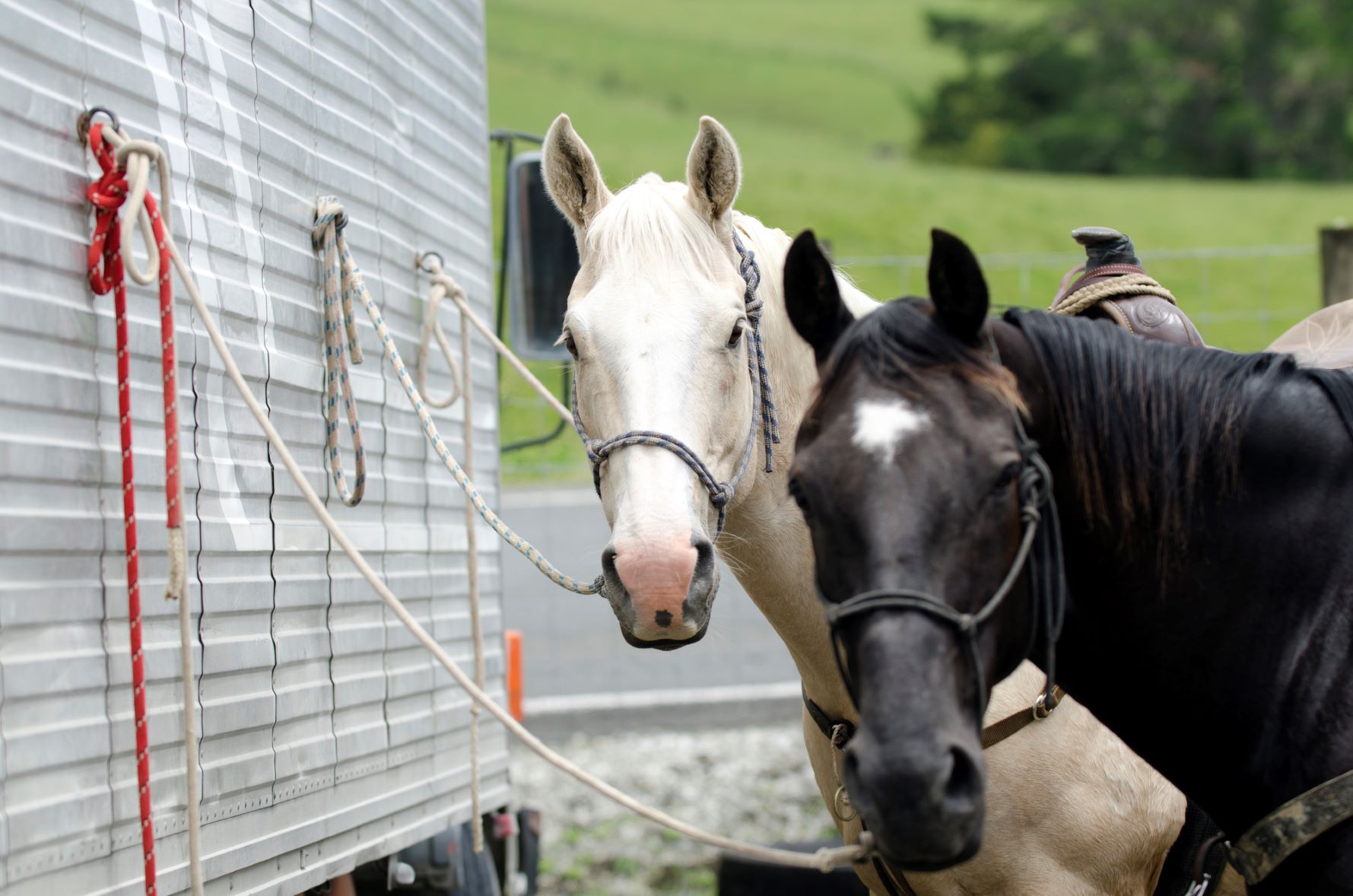While motorhomes open up a world of almost unlimited freedom, there are some definite downsides and drawbacks to these homes on wheels – not the least of which is sometimes figuring out what to do with family pets.
Sure, you might be able to motor down the road with your dog or cat in the motorhome itself (maybe even right upfront with you). But can a motorhome tow a horse trailer?
Many modern motorhomes can tow a horse trailer. You’ll need to consider items like your towing capacity and hitch setup. There are some other considerations as well. And we dig through most of those things below.
At the end of the day, though, the odds are pretty good; you’ll be able to zip down the road with a horse trailer behind without too much headache or hassle.
Don’t forget to check out our Recommended RV Equipment list!
Can a Motorhome Tow a Horse Trailer?
There are a couple of considerations you have to be aware of when it comes time to hook up a horse trailer to the back of your motorhome, including (but not limited to):
- The type of motorhome you have
- The class of motorhome you’re working with
- The type of hitch setup that you have outback
- The towing capacity of the vehicle
- The type of horse trailer you want to pull
… And that’s just the tip of the iceberg!
The chances are pretty good that if you’re talking about a decent-sized motorhome – either a Class A or large Class B motorhome – you’re going to be able to hook that horse trailer up without any issue, fill it with horses, and then start down the road on your next adventure.
Not bad, right?
It sure beats having a dedicated towing vehicle pull that trailer around and have someone pilot the motorhome separately, anyway!
What Kind of Hitch Do You Have?
One of the most important things to consider is the type of hitch you are working with.
Not all hitch setups are created equally, especially when talking about a motorhome.
Not all motorhomes are designed and engineered to be best-in-class towing options, though almost all offer at least a little bit of towing capacity.
The hitch setup you have will significantly impact how you tow with your motorhome.
Make sure you know the difference between a weight-distribution hitch, a fifth wheel, a conventional hitch, and a pintle hitch.
You need to know precisely what you are getting into as far as the overall design of the hitch you are hooking up to is concerned, but you also need to know what Class hitch you have. Hitches can be ranked from Class I to Class V. The higher the number, the more weight the hitch can handle safely.
You’ll want a minimum of a Class III hitch when you are towing a horse trailer.
What’s the Towing Capacity You’re Working With?
The next thing you need to think about is how much towing capacity you are operating with.
The average Class A motorhome has a towing capacity of around 10,000 pounds. Many can bump that up to 15,000 pounds or more. You’ll need to refer to your specific vehicle for your exact towing capacity.
A Super Class C can often tow close to 10,000 pounds, but there is a much wider range of capabilities in Class Cs RVs. You’re going to need to look at your specific vehicle’s maxes.
A Class B, the smaller van style, generally doesn’t have that type of towing capacity necessary for towing a fully loaded horse trailer. Or maybe a very small one.
What Size Horse Trailer are You Pulling?
As a general rule of thumb, a trailer designed to transport one or two horses will weigh somewhere between 2300 pounds and 3900 pounds (give or take).
That’s empty, though.
As soon as you start adding horses, equipment, and everything you need to move horses around safely, you’re adding at least a thousand pounds. Maybe even more.
You don’t have to be an engineer to know that RVs rated with a 5000-pound towing capacity will struggle (and struggle a lot) with 4900 pounds hanging off of the hitch. You generally don’t want to exceed 80% of your towing capacity.
At the same time, maybe you have had a custom horse trailer fabricated that is significantly lighter than your average options. Perhaps you have a smaller horse that you are moving down the road, and maybe you don’t have a lot of gear or extras stuck into the trailer.
Anything you can do to save weight will significantly impact whether your motorhome can tow a horse trailer, how it feels when it’s being pulled down the road by your vehicle, and how you respond as a driver.
How Comfortable Do You Feel Towing?
Let’s not underestimate the importance of feeling completely comfortable every time you slide behind the wheel of your RV.
Motorhomes are pretty big vehicles, significantly more substantial than a classic car or truck, and not something that everybody feels comfortable piloting down the roads – especially on the highway at those kinds of speeds.
Attach another 4000 to 5000 pounds of trailer and horse behind you, and you can start to spook yourself, especially if you haven’t done a lot of trailering in the past.
It’s essential that you feel comfortable behind the wheel of your motorhome when you have everything hooked up. It might not be bad to cruise around town a couple of times with an empty trailer to get a feel for things, then load it down with equipment and extras to simulate a fully loaded trailer operation.
That’ll give you the know-how and a little bit of experience with how the trailer responds and how the motorhome feels when you are towing.
The answer to can a motorhome tow a horse trailer means a whole lot less than whether or not you feel comfortable with this kind of rig rolling down the highways and byways of America.
Always Check Your Breaks!
Everyone that has done a bit of trailering understands the value of breaks that work the way you expect them to just as soon as you tap the brake pedal – and most folks that have been trailering for any decent period had experienced breaks that “when on the fritz” or just weren’t up to snuff.
Check your breaks (all of them on the motorhome) and check the brakes on the horse trailer. If they look anything other than brand-new – even just borderline – it’s not a bad idea to upgrade, overhaul, repair, or replace before you do any loaded trailer work.
The last thing you want to worry about is your breaks failing as you’re going down the highway (at highway speeds) with a couple of horses behind you. That’s a nightmare scenario nobody needs to have on their conscience.
Closing Thoughts
So there it is – the answer to can a motorhome tow a horse trailer or not.
The overwhelming majority of motorhomes on the market (especially newer models) will have the capacity to tow a horse trailer.
You still need to confirm a couple of things before you go hooking this kind of equipment up to the back of your RV and expect to rock and roll down the road.
First, you need to know precisely what kind of towing capacity your motorhome has.
Secondly, you need to know exactly how much your horse trailer weighs – completely loaded down, not empty, and sitting in the driveway. This is critical.
Third, you need to be sure that the hitch setup you’re using on the back of your motorhome is compatible with your horse trailer and that it isn’t going to put any undue stress on your vehicle or trailer.
Finally, you need to confirm that your breaks (the motorhome and on the trailer) are in perfect working order. You need to be comfortable with this equipment hooked up, and you need to be confident driving down the line that all your safety gear is good to go.
Once you have all of that sorted, you should be ready. It’s not a bad idea to hook up the trailer (empty) and drive it around town to get a feel for how everything handles, though.
That little bit of experience can prove invaluable when you go for the real thing!
Don’t forget to check out our Recommended RV Equipment list!
Get a FREE copy of the Go Together Go Far Travel Trailer Hookup and Disconnect Checklist when you sign up for the Go Together Go Far Newsletter!
Want to learn more about different types of RVs? Check out:
- Best Off-Road Camper Trailer Under $10,000
- Best Bunkhouse Travel Trailer Under 30 Feet
- Are Lance Travel Trailers Any Good?
- Do Rope Lights Deter Rodents?
- What Are the Best Names in the RV Industry?
- 3 Best Travel Trailers for Family of Four
- Blue Ox SwayPro Basics: Top Questions Answered
- Adding A Washer Dryer To Travel Trailer? What You Need To Know.
- Best Drone For Camping, Backpacking, and RVing: A Complete Guide to Drones for RVers
- Furniture and RVs – How To Get It Through the Door…
- How To Get Rid Of A Poop Pyramid In RV Black Tank
- Do You Know How Long To Keep Fresh Water In RV Tank Storage?
- What Is The Best Outdoor Security Camera System For Your RV?
- RV Bumper Mount Grills: 5 Best Options For Your RV Or Camper
- Best Electric Tankless Water Heater for Your RV. What You Need To Know
- Read Before You Buy! How to Find the Best Scooter for RV Camping
- 3 Best Travel Trailers for Family of Four
- Top RV Brands: What Are the Best Names in the RV Industry?
- Lance Campers: What Makes Them So Different?
- Best Bunkhouse Travel Trailer Under 30 Feet
- Best Off-Road Camper Trailer Under $10,000
- Best Weight Distribution Hitch With Sway Control For Travel Trailers in 2022
- What Are The Best Built Travel Trailers? Things To Consider.
- How Does An RV Refrigerator Work? A Quick Guide.
- Why Does My RV Carbon Monoxide Detector Keep Beeping? A Quick Guide.
- Where Is The Power Converter In My RV Or Travel Trailer
- What is the Best Generator for 50 Amp RV?
- Wireless RV Security Camera Systems: Is Solar Powered Security Without Wi-Fi An Option?
- Best Portable Air Conditioner for Camping for 2022
- How to Find the Best 3500 Watt Inverter Generator for RV Camping
- Best Propane Generator For Your RV: Read This Before You Buy!


